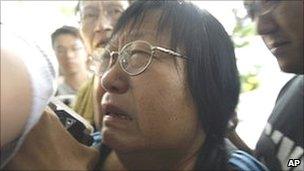Hong Kong warns against Philippines travel after deaths
- Published

Relatives of those killed are shocked and angry at the murders and the Philippine police
Hong Kong has expressed angry shock at the Philippines after the deaths of eight of its tourists in a bus hijack, cancelling all travel to the country.
The Chinese government has also demanded a thorough investigation of how the tragedy was handled.
Philippine President Benigno Aquino has promised to provide answers.
Questions have been raised over how police failed to enter the bus before eight tourists were shot by a rogue policeman.
The UK's Foreign Office has now confirmed that two of the survivors are British nationals.
The police commander in the Philippine capital of Manila, Leocadio Santiago, has defended the way his force dealt with the hostage-taking.
He told local television that it had been correct to let the siege continue until the bus driver escaped and reported that the hijacker had started shooting hostages.
Police then assaulted the bus, killing the hijacker, a disgruntled former policeman called Rolando Mendoza.
'Appalling'
In Hong Kong, a "black" travel warning has been raised, which urges all travel to the Philippines to be cancelled and calls on Hong Kong people in the Philippines to leave as soon as possible.
Around Hong Kong, flags are hanging at half-mast. The stock exchange planned a minute's silence for the hijack victims.
Two planes, carrying doctors and counsellors, have been chartered to bring back the survivors of the incident.
Chinese Foreign Minister Yang Jiechi telephoned his Philippine counterpart, Alberto Romulo, to say China "was appalled" by the murders.
"The Chinese government demands the Philippine government launch a thorough investigation into the incident and inform the Chinese side of related details as soon as possible," Mr Yang said.
Foreign Ministry spokesman Ma Zhaoxu said China had already sent a team to Manila handle the aftermath.
"China has requested the Philippine side to take pragmatic measures to ensure life and property safety of Chinese nationals in the country," he said.
Hong Kong's chief executive, Donald Tsang, said he was disappointed with the handling of the incident, and protests were reported outside the Philippine consulate in Hong Kong.
Philippine presidential spokesman Ricky Carandang said he was concerned about the level of public anger in Hong Kong, citing anecdotal reports of apparent retaliatory actions against Filipinos.
"We understand the anger and the dismay over the people of Hong Kong but at the same time, we don't think it's right that our ordinary citizens who had nothing to do with this should be paying the price," he said.
Promises
In a late-night news conference, Philippine President Benigno Aquino promised a "thorough investigation" into the incident.
Survivors and experts have criticised the police for being indecisive and slow in their handling of the crisis.
In the last hour of the siege, police failed in an attempt to board the bus, being forced back by gunfire from the inside of the vehicle.
Almost one hour later, they managed to get on board the bus. By that time, the gunman had been killed along with eight of the 15 passengers remaining on board.
"We want a thorough investigation of everything that transpired," Mr Aquino told a news conference.
He defended the actions of the police at the scene, saying the gunman had not shown any sign of wanting to kill the hostages.
But when asked if he was entirely satisfied with the police, he said: "How can you be satisfied if there were some people who were killed?"
One of the survivors, who identified herself only as Mrs Leung, told reporters: "Why was there no-one to help us after so many hours?"
She said her husband had been killed trying to stop the gunman from shooting other passengers.
"I miss him. I actually really wanted to die with him. But I think of my children," she said.
- Published24 August 2010
- Published23 August 2010